Therapeutic effect of Horticulture
Quietude and demureness through right livelihood (samma
aajeewa):
*****
How horticulture helps patients?
|

Sales outlet
|
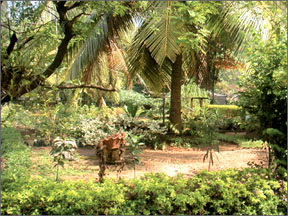
Horticulture project; beyond synthetic barriers |
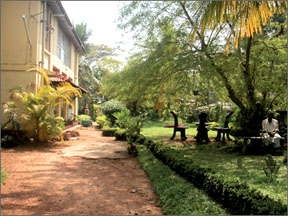
The hospital premises is well kept by the enthusiastic employees |
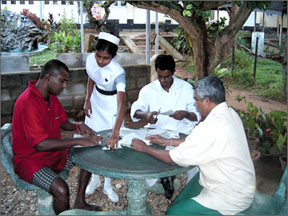
Correctly instructed by the efficient staff- result of the efforts
to change the attitudes |
When a person is suffering from mental illness for a prolonged
period, without returning to his or her normal life or by living in an
institution for many years, he or she becomes inactive and may lose
self-confidence and ability to make decisions and to control any aspects
of his or her life.
Horticultural Therapy is one of the rehabilitation tools that help
them regain their lost abilities and self-confidence and thus speed up
recovery. Working in a garden, improves one's power of concentration,
help learn new skills and person becomes more socialised by working with
a team and interacting with team members.
Self-esteem and a sense of responsibility are improved by caring for
plants.
Horticultural Therapy can be applied in different contexts; such as
children with learning disabilities, elderly persons and prisoners and
the refugees. This is also a kind of a meditation even practised in Zen
tradition of Buddhism.
***
by Ranga Chandrarathne
Although horticulture has been tried and tested in uplifting the
economic wellbeing of the impoverished segments of the population, but
it has not been tested on patients suffering from psychiatric ailments
for its therapeutic value and imparting the right livelihood (samma
aajeewa) skills to them.
The ambitious project which has been launched as a pilot project at
the Mulleriyawa Mental Hospital was aimed at removing the social stigma
associated with patients suffering from mental illness and to make them
socially acceptable and productive citizens.
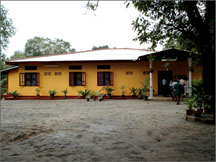
Home for employees |
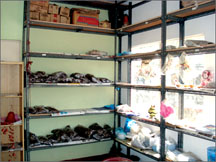
The produce; we are equally abled |
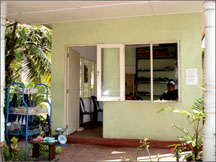
Sales outlet |
The Horticulture Therapy Training and Research Centre had been set up
by Basic Needs - Sri Lanka and the Ministry of Health, as a partnership
project in plot opposite the hospital.
Under the initial phase, the project was commenced with 20 inmates
who had been categorized as 'homeless' patients as they were abandoned
by their families.
It was imperative that in order to build self-confidence and decision
making ability, these destitute patients should engage in some gainful
activities which would not only restore them back to normalcy but also
impart them with good values for their life time skills.
These skills would, in the long term help to generate income and
facilitate speedy integration of patients into the mainstream society.
How horticulture helps patients?
When a person is suffering from mental illness for a prolonged
period, without returning to his or her normal life or by living in an
institution for many years, he or she becomes inactive and may lose
self-confidence and ability to make decisions and to control any aspects
of his or her life.
Horticultural Therapy is one of the rehabilitation tools that help
them regain their lost abilities and self-confidence and thus speed up
recovery.
Working in a garden, improves one's power of concentration, help
learn new skills and a person becomes more socialised by working with a
team and interacting with team members. Self-esteem and a sense of
responsibility are improved by caring for plants.
Horticultural Therapy can be applied in different contexts; such as
children with learning disabilities, elderly persons and prisoners and
the refugees. This is also a kind of a meditation even practised in Zen
tradition of Buddhism.
Sturdy progress
After taking over the allocated land, the project commenced in May
2003 with Angi from U.K, a voluntary officer from Basic Needs taking the
lead while hospital assigned Sister Padmarani and two nurses help out
with the project.
However, the expected cooperation did not come forth from the nurses
as their Union objected to the project. In order to obtain supportive
staff stuff, a group of young persons from the St. Johns Ambulance were
trained and appointed to carry out the project.
As the project progressed, it was been pointed out that a certain
percentage of the income generated should be distributed among the
patients involved in the project. As the patients were 'homeless', the
hospital intervened to open Postal Savings accounts books in their name,
to save money.
Though the patients did not show any marked improvement during the
initial stages, but as the project progressed, they gradually acquired
their lost skills. After a year, some of the patients were in a position
to be sent back home while others still remain. So far 30 patients have
completely rehabilitated and integrated into society.
In 2005, the entire hospital staff was trained in horticultural
therapy which, among other things, had changed the staff's perception on
the concept of Therapy. One of the positive spill overs of this training
was that the trained staff commenced horticultural activities in and
around their wards.
The Therapy can be applied on Tsunami traumatized persons and those
who are suffering from depression, as an effective antidote.
On the success of the training, it was further expanded to include
nurses and staff from mental hospitals from other parts of the country.
Another positive development was the building of three houses in a
corner of the hospital for use of eight homeless patients who are still
working for the project.
As any other worker who comes to work from his or her respective
homes, these destitute patients come to the Centre from 'their' homes
and work from 8.00 a.m to 4.00 p.m.
Their homes were ceremonially opened by the WHO Representative in Sri
Lanka Dr. Bora, in 2006.According to Director Dr. Jayan Mendis, the
hospital hopes to expand the project in collaboration with Basic Needs
and the project incurs an annual expenditure of one million rupees and
donors, partners or investors are invited to join the project.
[email protected] |
